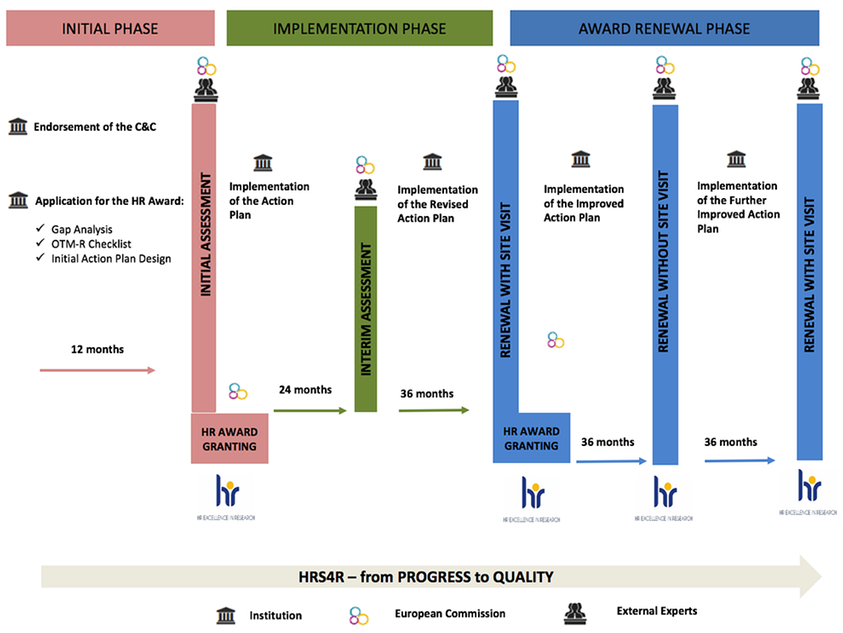Human Resources Strategy for Researchers (HRS4R)
Halmstad University received the award HR Excellence in Research from the European Commission in 2020. The award is given to employers who have a stimulating work environment, good conditions for researchers, merit-based and open recruitment processes – and continuously work to develop these areas. At the moment Halmstad University is one of 19 higher education institutes in Sweden that has the award.

Commitment linked to the award
Recipients of the award commit to structured and long-term work in order to implement The European Charter for Researchers and The Code of Conduct for the Recruitment of Researchers from 2005, also called the Charter and Code. These are issued by the European Commission and contain guidelines for good practice in the recruitment and employment of researchers, regardless of career level. The purpose is to create better conditions for researchers within Europe.
The work of implementing the Charter and code is assisted by the tool Human Resource Strategy for Researchers (HRS4R), which contains templates and mandatory procedures to follow in order to maintain the award. Each University defines its gaps in relation to the charter and code and creates a detailed action plan for their work. Progress is ensured through recurring internal and external reviews.
In December 2023 the EU Commission introduced the European Charter for Researchers, which is a revision of the 2005 Charter and code. The new version will be applicable for Halmstad University after the next review.
Charter and code – what does it stand for?
In 2005, the European Commission issued the recommendation The European Charter for Researchers and The Code of Conduct for recruitment of Researchers. The Charter & Code is aimed at researchers at all different stages of their careers – from doctoral students to professors – and covers all research areas.
The Charter & Code consists of 40 principles that determine roles, responsibilities and rights of researchers and employers. The principles are divided into four areas:
- Ethical and professional aspects
- Recruitment and selection
- Working conditions and social security
- Training and development
The overall purpose is to make research careers in Europe more attractive. It is about creating an open and sustainable European labour market for researchers, encouraging increased mobility, increasing female researchers’ participation and encouraging more young people to choose a research career.
By choosing a university that has chosen to sign the Charter and Code you can, among other things, be sure that:
- there is an interest in internationalisation and diversity and knowledge about mobility
- the recruitment process is transparent and merit-based
- your rights as a researcher are recognised
- a good working environment is a prioritised focus
It will also give you access to a pan-European network (Euraxess) consisting of research organisations and researchers offering career support etc.
Open transparent and merit-based recruitment (OTM-R)
Open, transparent, and merit-based (OTM-R) processes ensure that the best person for the job is recruited, thereby achieving greater equality, enhancing the competitiveness of national research systems, and strengthening international collaboration and cooperation.
OTM-R is a cornerstone of The European Charter for Researchers and The Code of Conduct for the Recruitment of Researchers.
The OTM-R policy of Halmstad University consists of two documents that incorporate the content of the OTM-R checklist:
- The Appointments Procedure is intended to provide a general description of the University’s eligibility requirements, assessment criteria and recruitment ethics for both appointments and promotions.
- The document Guidelines for Recruitment and Promotion clarifies eligibility requirements and assessment criteria and describes recruitment and promotion processes.
HRS4R at Halmstad University
In 2020 Halmstad University received the right to use the HR Excellence in Research award. The initial “gaps”, in relation to the principles, where identified through dialogue in various academic forums and committees. Some room for improvement were found in the areas of career development, access to career advice, judging merit and gender balance.
In 2022 an interim assessment of the HRS4-R was conducted and sent to the European Commission. The evaluators were satisfied with the ambitions and work conducted this far. Besides some minor changes the most important message was summarised in this comment taken from the Implementation Phase Interim Assessment – EC Consensus Report:
“It is clear that Halmstad University is working very hard to polish its internal procedures regarding human resources and career paths, and they have much work done. Until the site visit, the university has plenty of time to continue working in their new Action Plan with a new focus: to highlight all these efforts both inside and outside the university, using this seal of excellence as a spearhead for attracting international talent and funding.”
Since then the University has focused on conducting the planned actions, spreading knowledge about the HRS4R and the principles within the organisation and getting better at using the seal HR Excellence in research in external contexts.
A second internal review will be conducted in October 2025, followed by a desk-based assessment to secure the work in practise. If the result is found satisfying the European Commission will conduct an on-site vision with the aim of refining the work and determining whether the institution may retain the HR Excellence in Research award.
The action plan – examples of what Halmstad University has focused on
Examples from action plan, 2022–2025:
Swedish Language Instruction
Beginner courses in Swedish have been offered and continue to be available to the university’s international staff. Approximately 30 employees participated between 2022 and 2024.
Mentorship
The faculties have developed various forms of mentorship, such as support in writing applications for associate professorships and for doctoral students. A postdoctoral mentorship program has been completed.
Reception of Doctoral Students
Introduction and onboarding have been addressed across all faculties. One of the aims has been to increase the sense of coherence. The Doctoral Student Barometer confirms that the introduction has improved, but the measure remains a priority.
Collaboration on Career Support Initiatives
Opportunities for collaboration with other universities on career-supporting activities have been explored, resulting in lunch seminars, mentorship programs for postdocs, and a doctoral course focused on research funding.
Perception of Development Opportunities
Through focus groups, dialogue has been conducted on how women and men perceive their career opportunities and development in research and teaching. A report has been compiled showing some differences.
Competency-Based Recruitment
In dialogue with managers, the use of the competency-based and gender-integrated recruitment process has been followed up. A structure for training new managers in recruitment is also in place.
Examples of completed actions, 2020–2022
- Information and routines were developed for improved reception of international employees.
- Internal competence development opportunities, career paths and courses has been packaged and visualised.
- An annual dialogue has been introduced within the management team regarding the need for joint skills development initiatives, based on insights from, for example, employee performance reviews.
Timeline at Halmstad University
- Autumn 2025: second assessment and hopefully on-site visit
- 2023: continued work with action plan
- 2022: interim assessment
- 2020–2025: implementation phase
- 2020: Halmstad University was granted the HR Excellence in Research Award
2019: Application was submitted
2017: Letter of endorsement
The HRS4R process is described in the figure below.

More information
Read more about HRS4R at Euraxess External link.
EC response to internal review, 2022 pdf, 119.1 kB, opens in new window.
HH HRS4R Review 2022, including new actionplan pdf, 163.7 kB, opens in new window.
EC assessment , 14 July, 2022 pdf, 113 kB, opens in new window. pdf, 113 kB, opens in new window.
Halmstad University HRS4R Gap Analysis 2019 pdf, 1020.7 kB, opens in new window.
Halmstad University HRS4R Action Plan 2019 pdf, 414.5 kB, opens in new window.

